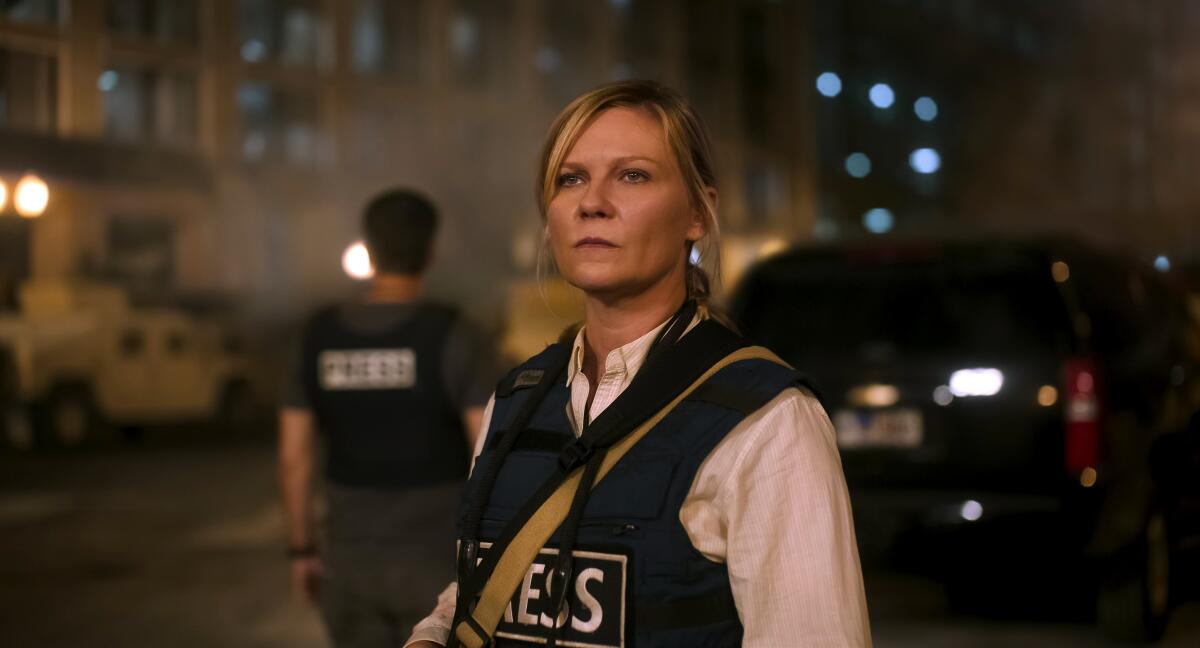Alex Garland’s “Civil War,” released on April 12, 2024, takes place in a near-future America where the nation is factionalized and eating itself alive. Bearing a two-starred flag, California and Texas formed an alliance known as the Western Forces in hopes of usurping the President (Nick Offerman) while other states vowed allegiance to him. The President is a dictator, three terms deep and bunkered in the White House, unconcerned about pulling the desolate country out of the civil war. So, across the country, artillery lights up the sky, riots break out and ghost towns and refugee camps flourish.
Capturing this devastation on their route to D.C. to interview the President is a group of war photographers led by Lee (Kirsten Dunst), a trauma-afflicted veteran. The team consists of adrenaline junkie Joel (Wagner Moura), fledgling Jessie (Cailee Spaeny) and Sammy (Stephen McKinley Henderson), whose best photojournalism days are behind him. The emotional bonds that Garland, the writer of the film, tries to string along never yield into the pseudo-family we expect the eclectic band to become. Regardless, the collective responsibility, the heavy air in the press van and (mostly) unspoken understanding of the death driving their work requires is always communicated well.
Lee and Jessie’s mentor and mentee relationship is the film’s throughline, but it’s far too superficial to justify its foreground. Save for Sammy, who has little purpose except for being a warm presence and a brief moment of glory, Lee is the least interesting character, solely defined by her trauma — a trope that demands wariness (absent here) if used. Lee sees her younger self in Jessie, so we understand there is a passing down of burden, trauma and passion between the two, slowly occurring as the novice overcomes her nerves and throws herself into the conflict, encapsulated in the penultimate scene. Still, because of Lee’s passivity, there aren’t enough scenes of her influence being exerted, leaving Jessie’s metamorphosis up to circumstance and herself.
A slant that “Civil War” seems to only graze, through monochrome snapshots of Jessie’s photographs, is how events, people and places become immortalized through photography. That is to say, there is a missing, deeper reflection from the team on their work after a life-threatening shoot. A brief scene where Jessie scans and observes her negatives is the closest we get to such thought. Garland does, in certain interlude-like scenes, reach for another type of profundity: beauty amidst the destruction, but it never assumes form. Working against this half-hearted gesture is the film’s assemblage — the hard cuts to violence or graceful melodies succeeding the other are thrifty at best and manipulative at worst which blunts the building and releasing of pressure.
Punctuated across this fluctuation of tension are stops, rarely voluntary, in the team’s road trip. Viewing these scenes altogether results in a rather antithetical, inconsistent depiction of war and violence. Take the sequence involving an encounter with a jingoist militia soldier (Jesse Plemons) or the sniper standstill; each is played out to rack the nerves but is vaguely written to convey the notion that war is senseless. The violence here is appalling but, more importantly, blunt, making it all the more potent. It’s also difficult to think of a recent film where bullets sounded so heavy and resounding, appropriately deadly unlike its expected slick or dampened on-screen persona.
Contrast this to the film’s final act, where the photographers arrive at the White House, a now bombed-out frontier under heavy invasion. The need to have a conventional show-stopping climax devolves “Civil War” into that like a video game, betraying its unglamorous depiction of war for the very opposite. The approach of keeping the camera close to the actors rather than their surroundings is lost with the camera and Garland is seemingly more interested in helicopters and tanks blowing up the faceless enemy. It’s a formally well-executed finale, but like the rest of the film, it is non-committed and scatterbrained in thought.
Verdict: Lacking charged characters and a holistic vision, “Civil War” plays like a film in its conceptual stages.








